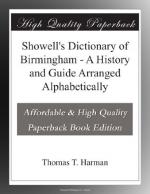Horrible.—The bodies of eleven children were found buried at back of 68, Long Acre, Nechells, where lived Ann Pinson, a midwife, who said they were all still-born, July, 1878.
Long Firms.—A term applied to rogues, who, by pretending to be in business, procure goods by wholesale, and dispose of them fraudulently. W.H. Stephenson, of this town, a great patron of these gentry, was sentenced to seven years’ penal servitude, Nov. 22, 1877, for the part he had taken in one of these swindling transactions, according to account by far from being the first of the kind he had had a hand in.
Next-of-Kin Frauds.—Many good people imagine they are entitled to property now in other hands, or laid up in Chancery, and to accommodate their very natural desire to obtain information that would lead to their getting possession of same, a “Next-of-Kin Agency” was opened in Burlington Passage at the beginning of 1882. The modus operandi was of the simplest: the firm advertised that Brown, Jones, and Robinson were wanted; Brown, Jones, and Robinson turned up, and a good many of them; they paid the enquiry fees, and called again. They were assured (every man Jack of them) they were right owners, and all they had to do was to instruct the firm to recover. More fees, and heavy ones; the Court must be petitioned—more fees; counsel engaged—more fees; case entered for hearing—more fees, and so on, as long as the poor patients would stand bleeding. Several instances were known of people selling their goods to meet the harpies’ demands; clergymen and widows, colliers and washer-women, all alike were in the net. It became too hot at last, and Rogers, Beeton and Co., were provided with berths in the gaol. At Manchester Assizes July 18, 1882, J.S. Rogers got two years’ hard labour, A. Mackenzie and J.H. Shakespear (a solicitor) each 21 months; and E.A. Beeton, after being in gaol six months, was ordered to stop a further twelve, the latter’s conviction being from this town.
Novel Thefts.—A youth of nineteen helped himself to L128 from a safe at General Hospital, and spent L13 of it before the magistrates (Jan. 15, 1875) could give him six months’ lodgings at the gaol.—Three policemen were sent to penal servitude for five years for thieving July 8, 1876.—Sept. 19, 1882, some labourers engaged in laying sewage pipes near Newton Street, Corporation




